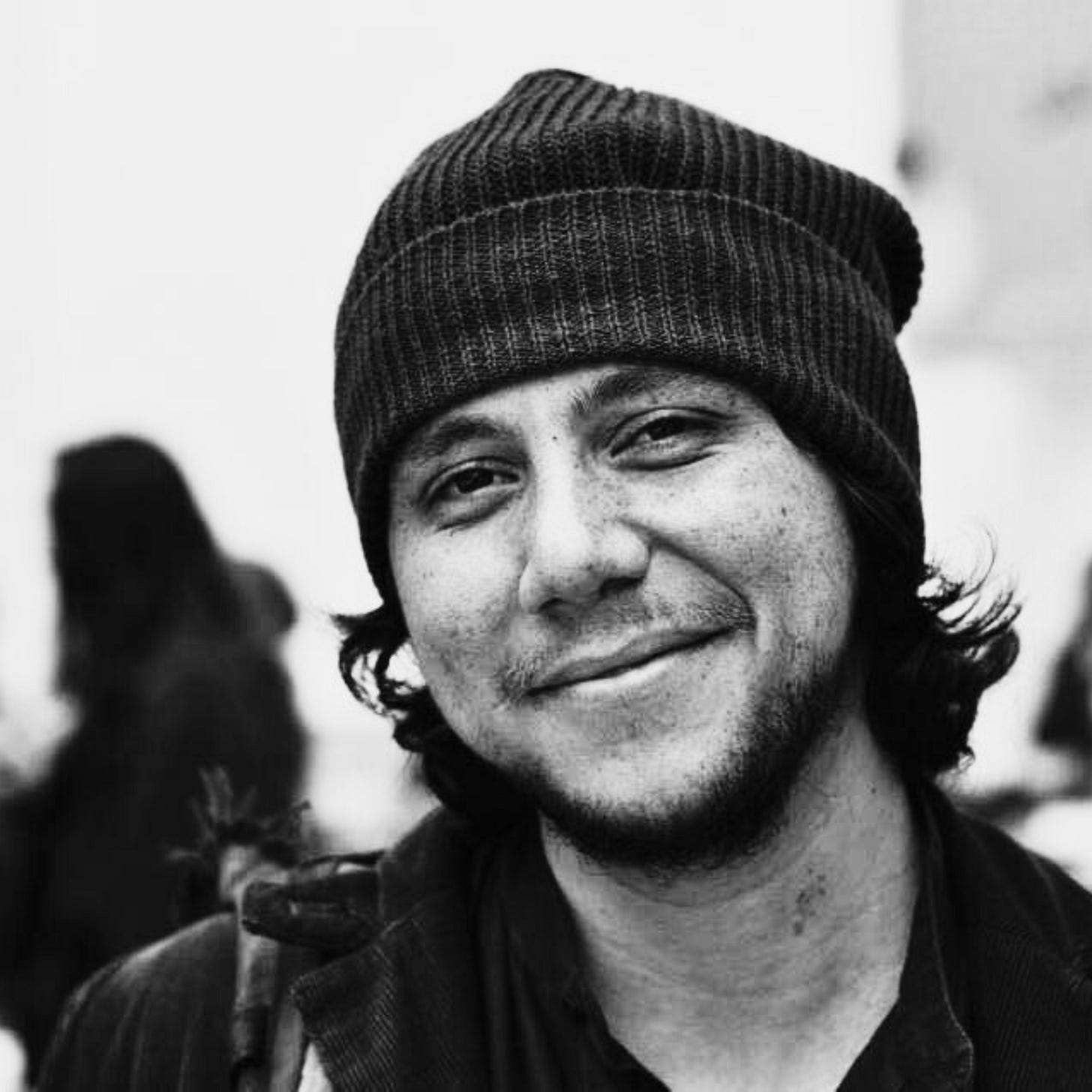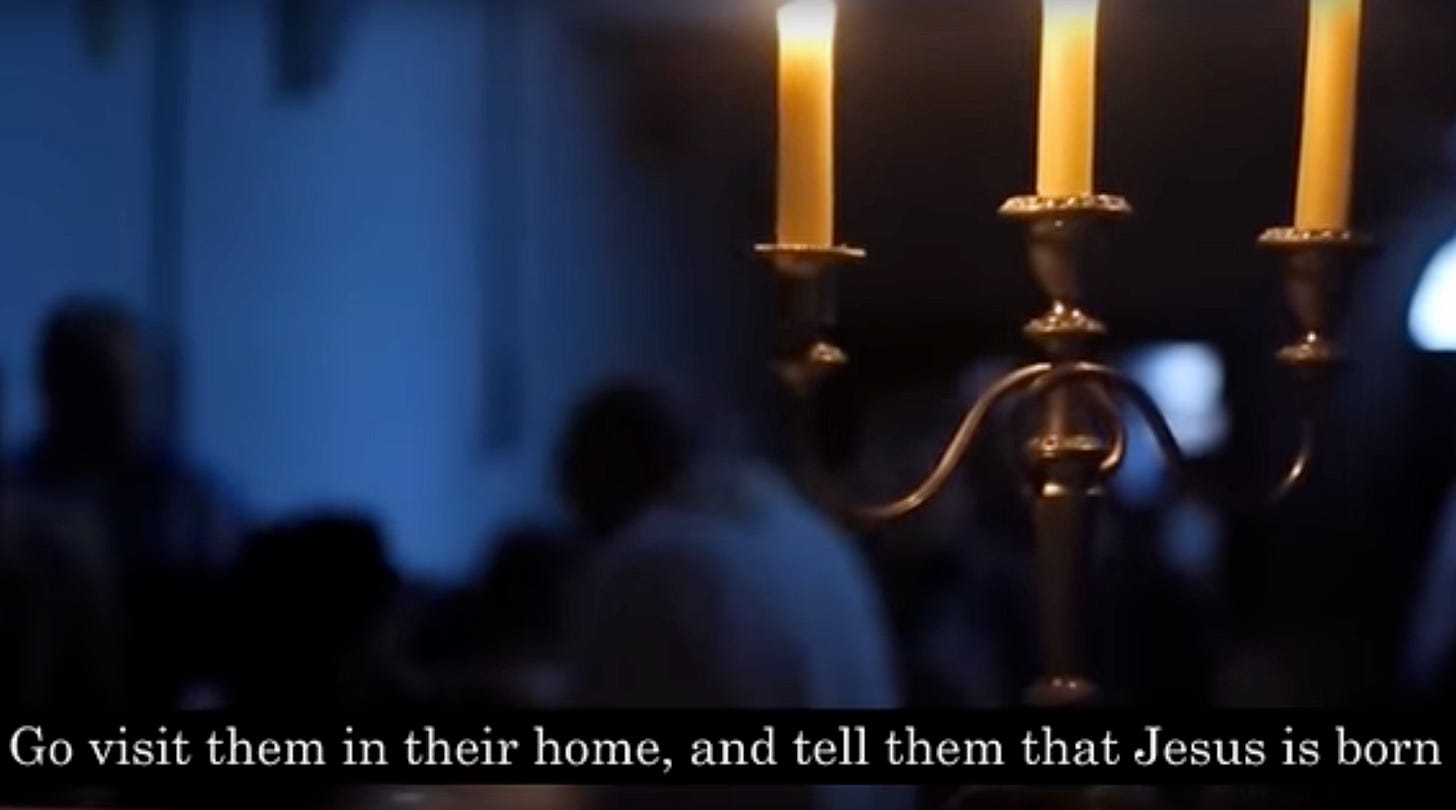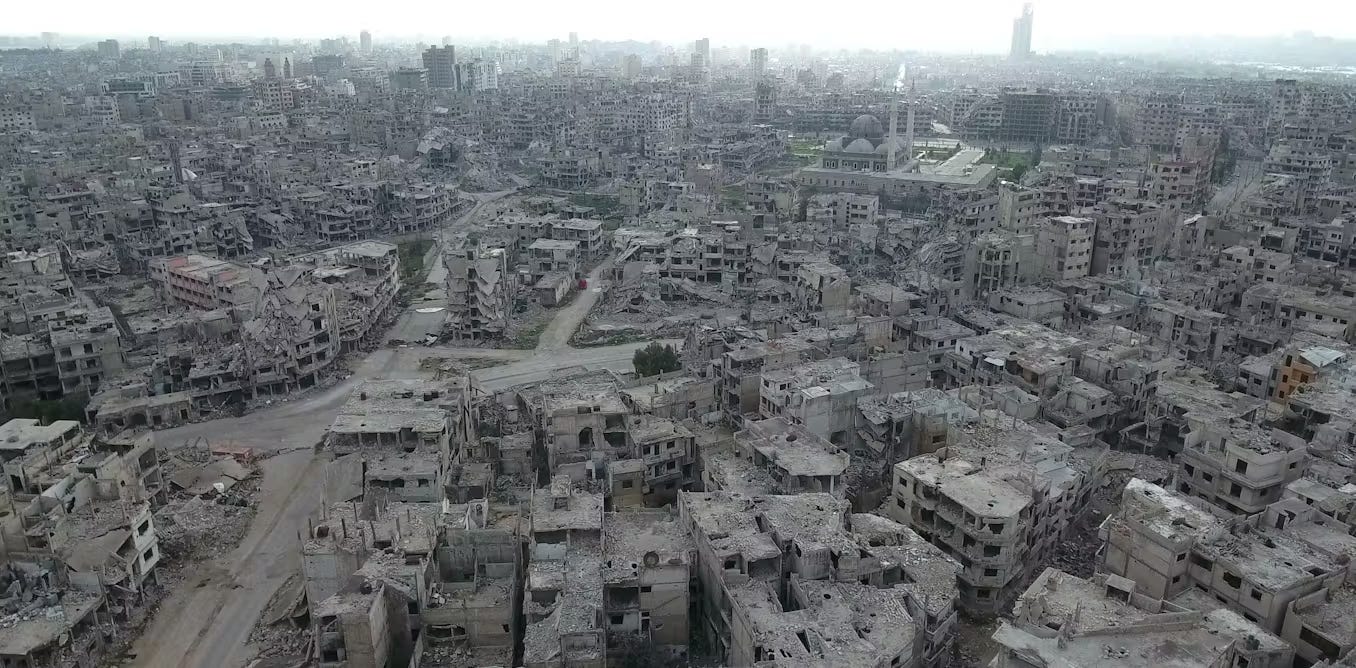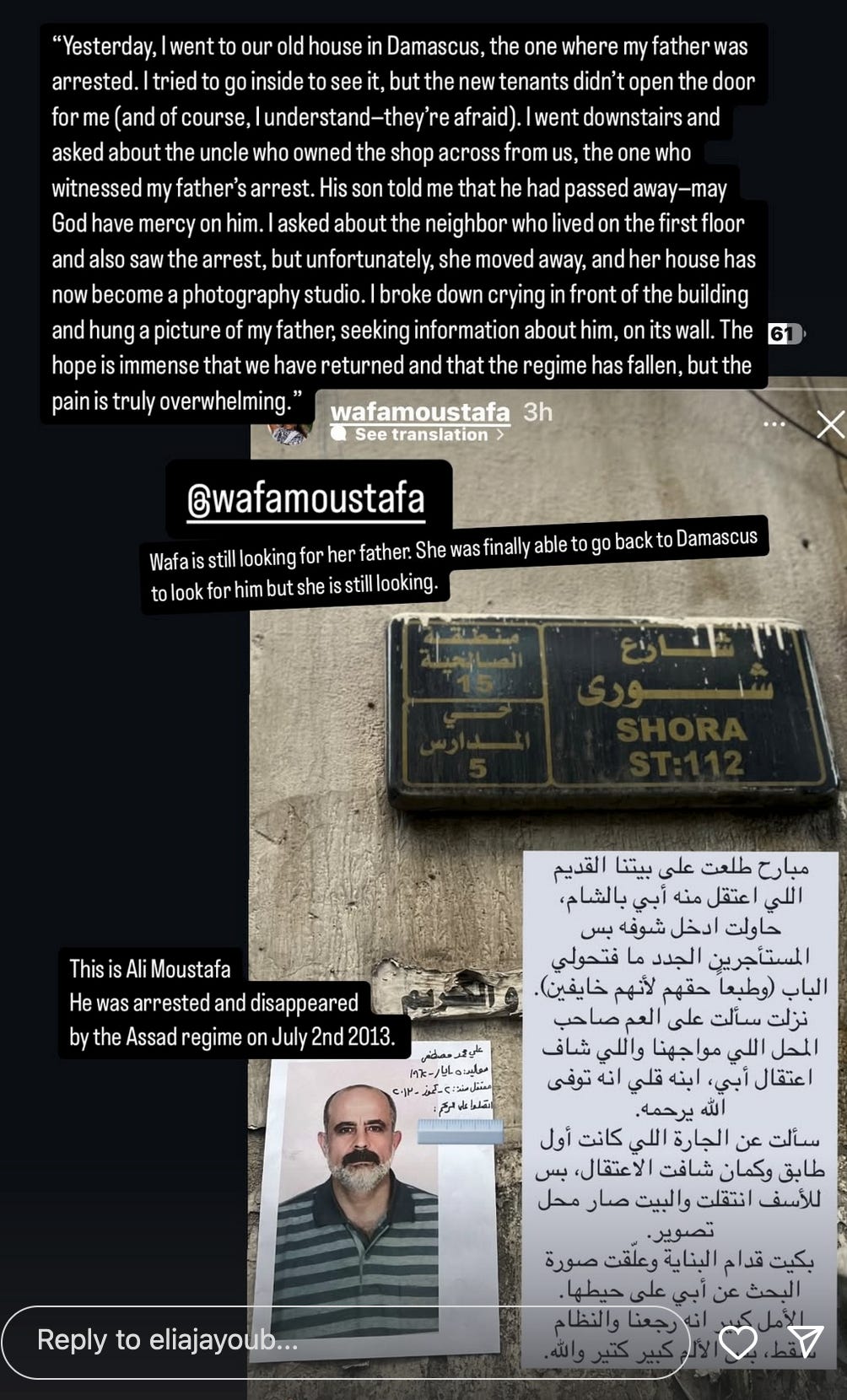Merry Christmas Homs
Tribute to Bassel Shehadeh's last city
Hauntologies essays and articles are free for the first two weeks, after which most are paywalled. Some remain free, some are never made public. To gain access to all of this websites’ archives, please consider a paid subscription. By doing so, you will gain permanent access to the archives.
This piece will remain free.
Merry Christmas Homs starts with the sound of an airstrike. It gets quieter, if only for a moment, and we find out that we are in a church.
The worshipers, whose faces we never see, are singing ليلة الميلاد (Christmas Eve), a Christian Arabic folk song which professes that the true nature of Christmas - and therefore of Christianity - is “when we offer a glass of water to a thirsty person” and “when we clothe a naked person with a gown of love.”
The message is made all the more powerful by the sound of the Assad regime's airstrikes in the background, at times getting closer. This is Homs, Syria and the footage is part of a 14 minutes-long film uploaded on Bassel Shehadeh's YouTube channel on December 23rd, 2012.
Bassel was a filmmaker and activist as well as a well-known figure of the first two years of the Syrian revolution. He filmed the above during Christmas of 2011, his last Christmas.
On the 28th of May 2012, Bassel was killed by the Assad regime in Homs. He was 28.
We know a lot about those days in Homs because Bassel filmed them and gave interviews. Knowing what happened to Bassel makes this film difficult to watch. It feels meditative today, as if I'm partaking in a moment of quiet reflection as one might do in a church.
“We are living a real Christmas even though it's hard,” we hear a woman say in the church:
“The truth is hard, bitter and sometimes painful. In such conditions Jesus was born. Maybe this Christmas I've felt something more real. People are feeling more for each other. They no longer think what they will wear, how to decorate or what to eat. We are thinking of the true meaning of Christmas.”
The airstrikes never stop. In those moments we see a world that would soon be buried under the rubble. It feels like watching ancient footage, but it is only 13 years ago. The destruction of Homs was already underway by then, and it only got worse in the years to come.
By the time the Assad regime was ‘done', Homs looked like this.
I wrote most of this text in November 2024, which means I did not know that the Assad regime would collapse before publishing this.
While I joined many in celebrations, as well as in grieving those who were killed and being worried for those who have yet to be accounted for, I also found myself angry.
I'm angry at the fact that Homs happened and then the rest happened anyway, that this so-called international community did nothing to stop Assad from doing to them what he did to Homs.
How many of the tens of thousands of forcibly disappeared could have been with us had the world reacted differently to Assad? It took rebels 10 days to force that regime out of Syria. This could have happened much sooner than 2024. It could have happened before Assad turned Homs into ruins.
My friend Wafa Moustafa's father, Ali Moustafa, was forcibly disappeared by the Assad regime on the 2nd of July 2013. This was over a year after Bassel was killed.
The world already knew everything it needed to know about what the Assad regime was capable of by then. We learned nothing new since then, only additional details in an already hellish landscape. Most of those details would have never been added had Assad been stopped then and there.
The regime collapsed anyway because it was being artificially kept afloat by Iranian and Russian forces. It was already a shell of itself by the time Bassel was killed, and it remained as much of a shell by the time Ali was kidnapped.
Why did it take 11 more years before the regime finally collapsed?
The hard, bitter and certainly painful truth of the matter here is that Syria was abandoned by a world that, to quote the teacher-turned-activist Al-Hamdo during the fall of Aleppo, “doesn't like freedom, it seems.”
I can't help but think of those words uttered in the church, that such nightmarish conditions once birthed Jesus and therefore do not have to be the end of this story. There is a stubborn hope in all of this, a hope that many Syrians proved was worth maintaining when virtually everyone else had long forgotten and moved on.
Back to Merry Christmas Homs. We get out of the church. Shortly after, the group of young men that Bassel was with identify a regime sniper, perhaps more.
“Should we make a run for it?”
“Go.”
They run. The sniper shoots a number of times but misses. One of Bassel's friends decides to taunt the sniper:
حرية للأبد، غصب عنك يا أسد
Freedom forever despite you Oh Assad.
The sniper shoots again.
He misses.
The man does it again, the sniper shoots and misses.
A few more times.
He is now joined by the entire gang, and they chant again.
حرية للأبد، غصب عنك يا أسد
Freedom forever despite you Oh Assad.
Merry Christmas Bassel. I'm sorry you are not home with your loved ones at this time of the year as I get to be.
All I can say here is that you did not die in vain. I wish I could tell you that the world got better, that we somehow learned from the horrors of the past 13 years. I don't know that we did, or that we ever will. What I do know, and this is something I wholeheartedly believe to be true, is that “the world is held together by the love and passion of very few people” as James Baldwin put it. I think you were one of those people.
Bassel's insistence on non-violence could only be described as an act of love for Syria. I don't even know if it was the right position to take. I genuinely don't know. Assad was overthrown through force of arm, after all.
Perhaps this is not a matter of what is correct and what isn't, but rather that both positions are somehow part of a spectrum that we all need to engage with, and that they both have a vital role to play in building free societies in our world today.
Today, we need people like Bassel to remind us all that there are still many Syrians searching for their loved ones, that the victory over Assad is incomplete without them.
The disappeared are neither dead nor alive as long as their loved ones do not have the answers they deserve. They are now hauntings, meaning that their presence/absence looms large over Syria's future. It is up to Syrians to make sure that all those who are still with us are found and reunited with their loved ones, and that all those who are not are mourned and their loved ones allowed to grieve and heal. It is up to the rest of the world to let them do so, and help in the process wherever possible.
Failures to do that creates a frozen temporality with entire segments of society excluded from talks of Syria's future. Syria cannot afford to erase them, nor should it. As a Lebanese who spent years researching and writing about our forcibly disappeared, I can only urge Syrians to not repeat our mistakes. Too many of us forgot, and our society continues to suffer as a result of that.
Bassel can finally be mourned by those who were denied by the Assad regime to go to his funeral in 2012. He deserves that, and so do his loved ones. Ali deserves to be found. He deserves that, and Wafa deserves to find her father.






Absolutely haunting
That was such a beautiful, devastating piece.